In 2023, I had the pleasure of attending Playtopia Festival for the first time. The welcoming atmosphere was unforgettable. Amy Blanchard, the festival’s production coordinator, made us feel at home. This warmth is a hallmark of Free Lives, the South African indie game development studio behind Playtopia. Beyond the festival’s vibrant energy, I recently spoke with Dominique Gawlowski, the managing director at Free Lives and the festival director at Playtopia. I enjoyed learning about her fascinating journey and getting insights into how one can foster a great company culture.
Before entering the video games industry, Gawlowski spent nearly two decades in the music industry, a career she cherished and that afforded her tours around the world. However, unforeseen challenges sapped her initial joy, leading her to make some major decisions. Gawlowski leverages her extensive experience running her own company, managing artists, and organizing events in her current roles. In 2023, she was named Person of the Year by Games Industry Africa. Join me as we delve into Gawlowski’s story and uncover the magic behind Free Lives and Playtopia.
Gawlowski’s parents had her later in life. Her older siblings introduced her to various interests, some of which helped her refine her musical palette. “My brother and sister had great taste in music. So, from when I was little, I was already listening to Queen, Depeche Mode, The Police, and Pink Floyd, compared to friends who didn’t have older siblings and were listening to kids’ music. For me, that was really cool. Having older siblings introduced me to a lot of things I would never have been exposed to.”
Strategic friendships
Even though Gawlowski admits, “From the moment I could crawl, I was always interested in things like skateboarding versus playing with Barbie,” she also confesses, “It was helpful to have a brother around because I could just take the things that were bought for him because he’s the boy.” Despite her parents being anti-games, she enjoyed racing games on her brother’s old Commodore and formed strategic friendships with kids who had Nintendos. And as a teen, she befriended those with PS1s. Before that, when she was a little younger she would sneak into her dad’s office to play MS-DOS games like Spacewar and Flight Simulator on floppy disks. And with some pocket money earned from doing chores, she would rent Segas from her local Dial a Movie.
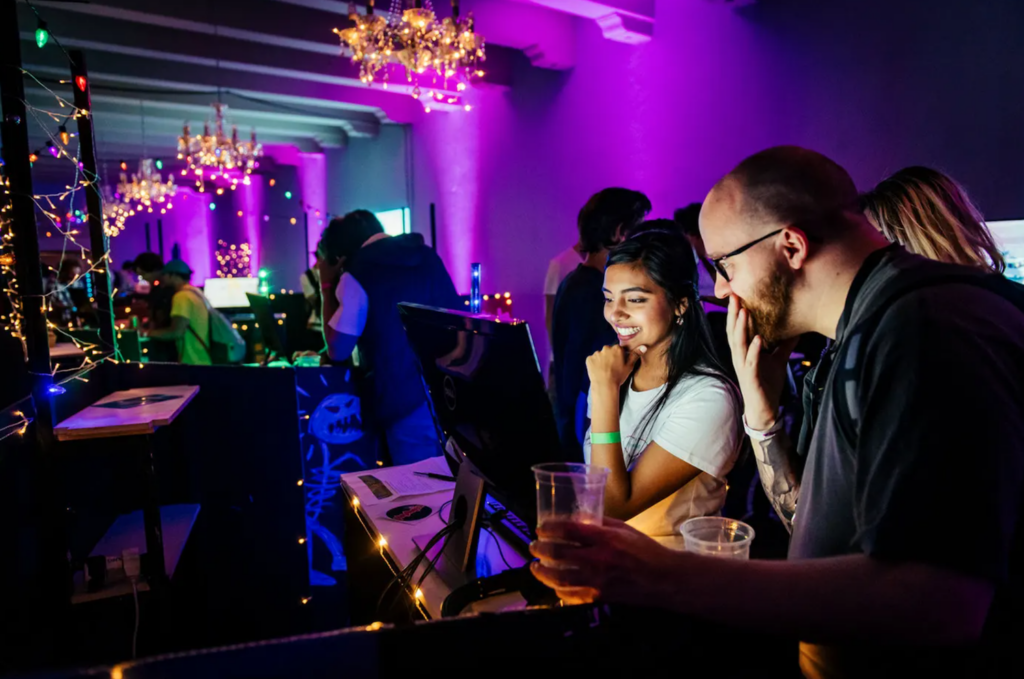
Gawlowski always knew she wanted to work in the creative industry, but her parents had other plans. “My parents wanted me to study law and thought it was about being in court in front of a judge.” But her friends with lawyer parents told her, “Good lawyers need to be comfortable sitting in the dark and reading for long periods.” Humorously Gawlowski notes, “That is definitely not for me. I would die of boredom.” Thankfully, her parents came around, and she studied film at the University of Cape Town. “I picked the only course that looked interesting. It was their first time bringing in the full curriculum. At the time, the course was purely theoretical. I thought we’d learn how to use cameras, edit, direct, and produce, but there was none of that.”
Die of boredom
At university, she joined the radio club and shadowed the music manager. “I spent every day with the music manager. I knew the job really well and was obsessed with music.” When the music manager was about to graduate, Gawlowski recalls he told everyone, “‘She’s a logical person to take over.’ So, I did, and 3 years after film school I started managing musicians, and bands, and organizing events, concerts, and festivals.”
Towards the end of her university, she started Sub_Urban Magazine, a multimedia magazine “It contained articles about local artists, musicians, and philosophers. We ended up receiving an award from Design Indaba.” Through the magazine, she introduced two musicians to each other and they later asked her to manage their band.
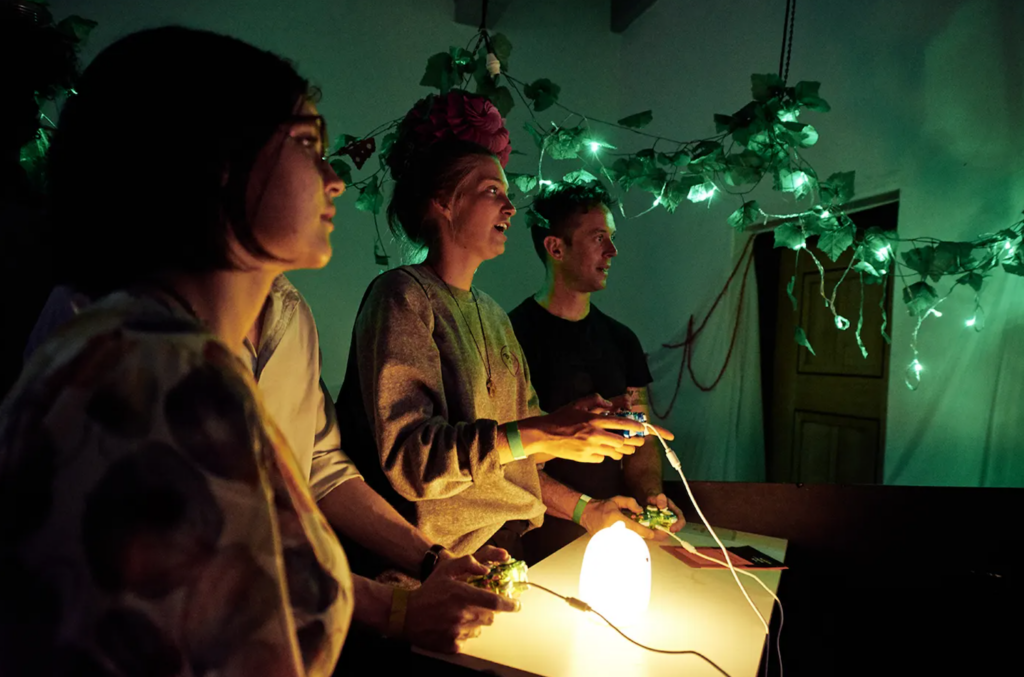
However, after 6 years, she took a break from managing the band and sought employment. “I looked for the highest-paying job I could find. I found one, it involved producing videos for a businessman trying to start Ted Talks but purely for business. We interviewed top business people. It was very corporate. I learned a lot but wanted to die of boredom by the end of the year. Corporate is not for me, and I really missed music.”
Sucked the joy out
Upon reflection, Gawlowski realized, “I left music because I felt like I worked for the band, and if the band didn’t agree with something I said, it just didn’t happen. I needed more autonomy.” Using the money saved from that corporate job, she moved back with her parents and started a music company with her friend.
“I got to travel the entire world with music. Haezer was a very successful artist. I think we did over 15 international tours, so I got to learn what it’s like to be on the road and saw how bigger teams operate. We started managing some of the big and well-known bands in the music scene at that time. We had our own big music festival with about 5,000 attendees that we did annually in Johannesburg called Grietfest.”
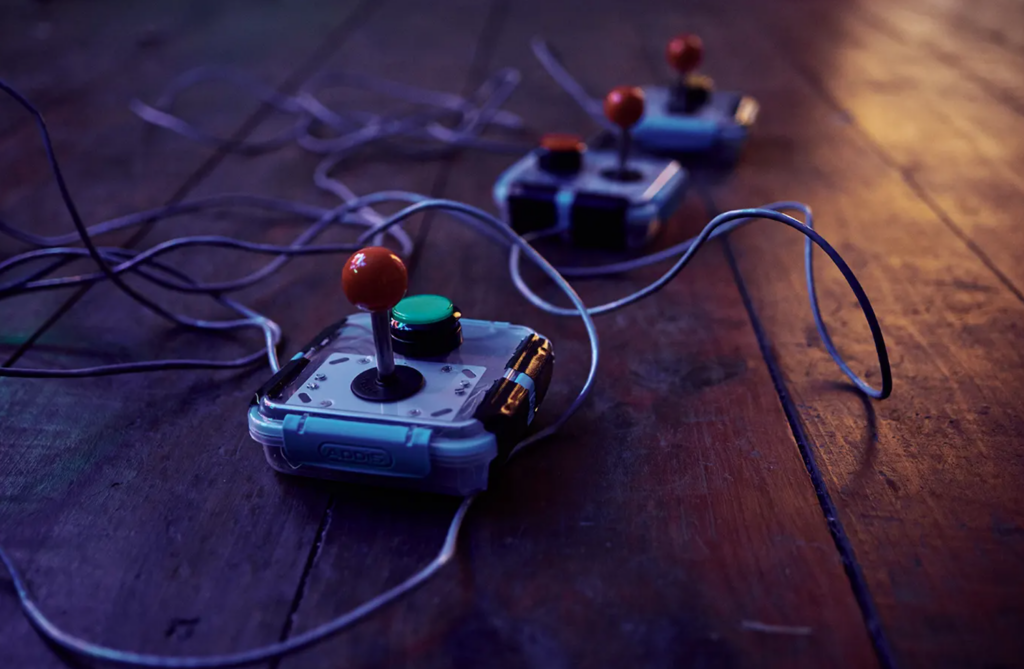
“And pretty much that was my life for 18 years. I was climbing up the ladder of the music industry but as I got older, I started getting more disenchanted with the industry.” Over time, “music became very competitive and it sucked the joy out. The industry is also very male-dominated, and I felt less feminine because I had to become a lot tougher and more verbally aggressive to assert myself. It changed my personality.'”
Creative journey
Eventually, she decided to leave the music industry for good. “I had no idea what I was going to do next, but I’d been running my own company for 15 years and I had accumulated a lot of knowledge and skills. So, when Evan Greenwood from Free Lives, reached out and asked me to organize Playtopia. I thought the timing was spot on. I was reluctant at first, but as I got to know them, I realized I’d still have total autonomy. We encourage people to try things, even if they fail. It’s part of the creative journey. I don’t feel tied down at this company.”
“We take a holistic approach to make employees feel valued. When Free Lives started, Evan borrowed money from his parents to make Bro Force, and thank goodness it worked out. I’m not naive to the fact that we have the money to do some of these things now. We support employees with mental health, career counseling, and wellness exercises like Pilates and yoga. We also have a chef who cooks healthy meals daily.”
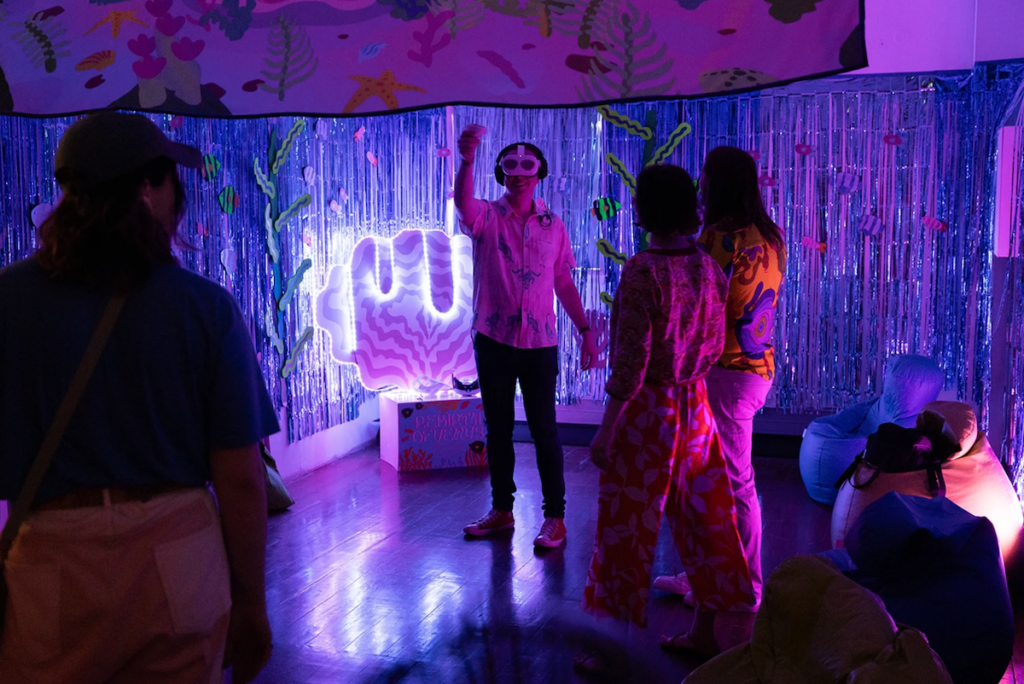
“We share profits with employees, making them feel like co-owners. Their salary is one thing, and they get a good bonus if the game is successful. This makes them feel valued and respected. We run the company almost like a group, considering everyone’s opinion before making major decisions.”
Walk around barefoot
“We often take the whole company on away jams, where we make games in nice places. Every one of our games has come out of these jams. We don’t see them as luxuries but as an invaluable part of our business strategy. We take them somewhere nice, where they get to let go and walk around barefoot, braaing and eating together every day. This is where the magic happens!”
Free Lives aims to lower the barrier to entry for those interested in video games by hosting events like Playtopia, Makers Massive, and Jam Dole. I found Playtopia more relaxed, health conscious and playful than any festival I had attended before. It was founded in 2018, and is Africa’s first annual Indie Games & Immersive Arts festival and conference. It brings South African and global creators as well as players together to celebrate the African scene.
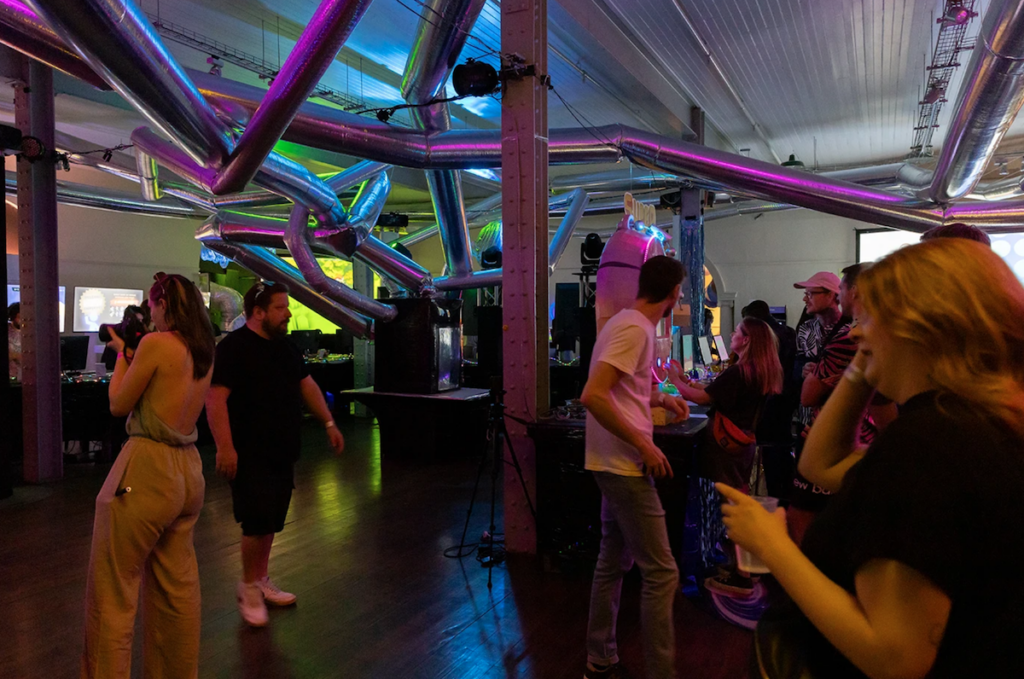
Makers Massive provides a space with computers for aspiring game developers to work on their projects, engage in talks, and meet like-minded individuals. Jam Dole, on the other hand, helps developers quickly test their game ideas. As Gawlowski explains, ‘We realized that throwing money at game ideas that fail after months isn’t effective. So, we use a model where we pay people 10,000 Rand to create a playable prototype in two weeks. If the public likes it, they can move forward. If not, we encourage them to bin it and move on. This fail-fast approach saves time and is the strategy Free Lives employs.”
High quality of speakers
“We’ve opened a non-profit organization, the Playtopia Foundation, which houses Playtopia, Makers Massive, and Jam Dole. This allows others to donate and help more people prototype. Free Lives has a set budget for prototyping, but now anyone can contribute to these initiatives to support more developers in accessing the game industry meaningfully.”
“We also designed Indie Planet at Playtopia. It’s an exhibition where top gaming events like Amaze in Berlin, Now Play This in London, We Play in Australia, and BitSummit in Japan participate. Traveling overseas is tough for Africans due to geographical and financial constraints, so we bring the best of these festivals to Playtopia. They showcase their festival highlights and create themed areas within Playtopia. Our goal is to eventually bring their developers for talks and workshops, making it a richer experience for local devs.”
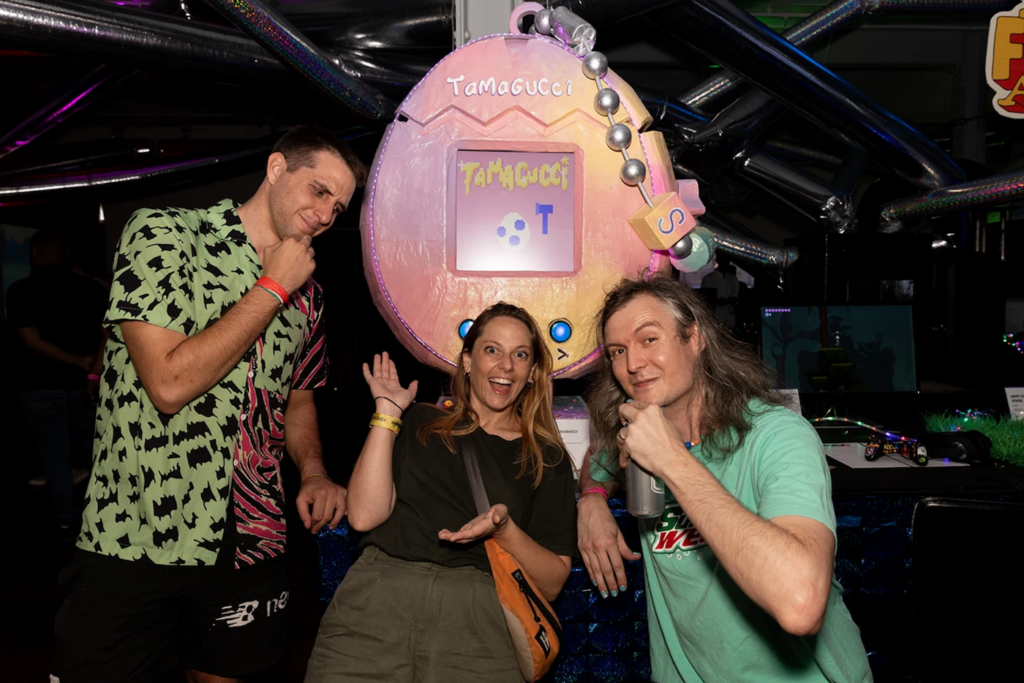
“Ben Rausch is the Program Director for Playtopia. He spends hours researching and selecting speakers. We don’t just choose industry big names or hit game creators; we look for those who are experienced, engaging speakers. We want attendees to leave feeling amazed, having learned a lot from captivating, imaginative, and funny presentations. The quality of our speakers is very high because we understand attention spans are short, and people pay to attend. We want every talk to be worth their time.”
Giant Tamagotchi
Reflecting on her entrepreneurial journey, Gawlowski says, “They always say don’t go into business with friends, but that’s too black and white. I had a wonderful time working with a good friend for 15 years. We had ups and downs, but our bond was strong enough to handle it. However, I once went into business with someone I didn’t know, and it was a disaster. The person didn’t care about me, which had severe consequences. I’ll never go into business with someone I don’t know again.”
She has had the support of family and friends, and Free Lives’ great company culture has made balancing her roles easy. Some of her highlights from Playtopia 2023 included the arcade, the giant Tamagotchi and Marie Foulston’s video installation. “I really loved The Grannies, a video about online players who found a glitch in Red Dead Redemption and made a documentary about it. They discovered a whole other world in the game, and Marie brought it together beautifully. I was absolutely enthralled by that piece.”
Regarding the games she has been a part of, she said, “I’m really proud of Tera Nil and our collaboration with EWT. We donated 8% of the game’s profit to the Endangered Wildlife Trust (EWT), a non-profit in South Africa. Their footprint extends outside of South Africa towards the eastern part of Africa. They do amazing work in education and habitat preservation. We were able to donate over 2 million Rand, allowing them to work on projects that wouldn’t have been possible without that money. Tera Nil has made a real positive impact towards this beautiful continent that we have.”
If she could speak to her younger self, she’d say, “Don’t worry, because I worried a lot. People told me I was making wrong decisions. I constantly wondered if I was ruining my life or if I’d become a burden. But it all works out. Just keep doing what you’re doing.”

